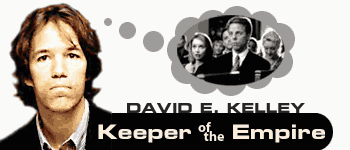
| ||||||
|
| ||||||
| SEPTEMBER 1999 | FEATURE RELATED ARTICLE ALSO THIS MONTH LAST MONTH |  GREGORY J. ROBB Anyone who studies art forms is often disturbed to find that many of today's great ideas were done as recently as one generation ago. As our summer schedules and holidays leave the horizon for the dawn of autumn, we are set to again perch on the edge of our seats to be gripped by the next phase in dramatic storytelling. The worlds of David E. Kelley fire up again with the brilliance of a man who reigns as the emperor of television drama. But Kelley's current dominance is at least partially owed to his predecessor, Steven Bochco - the producer of today's method of storytelling. Hip, fast-paced TV dramas with multiple story lines date back to the early 80's and the Bochco-produced "Hill Street Blues." The scene always opened with a morning meeting where the lovingly-weathered Sgt. Stan Jablonski gave out the day's assignments to his officers and, in so doing, set up the episode's story lines. The rest of the show not only played out the stories by adding bits to each one alternately; often, each story had a thematic link to that of the entire episode. The little stories always contributed to the bigger one. It was one of Bochco's greatest early achievements. One of the show's pioneering achievements was to present television in a hybrid documentary form - a form which has always produced a feeling of pure reality. "The Hill" was a dumpy-looking place where most of us would not choose to work; when did we not see Det. Mick Belker with a beard in various stages of thickness? True to reality, the characters had ongoing differences in ideas and approaches, perhaps none more conflicting than those between the social-liberal dogma of Lt. Goldblume and the brute force of the conservative Lt. Hunter. At times, the whole precinct was gripped with a tension that could only be tightened by great stories.
"Once you start lying about your feelings, it's easier to lie about the facts." "Hill Street Blues" was almost too real; it was the lowest rated series to be renewed into subsequent seasons but, as we know, it ultimately won critical acclaim and a record number of Emmy nominations and awards. In 148 episodes, it struck a chord with an audience alienated from the pretenses of general prime-time television. Viewers came to like the reality more than the fantasy. The bond had also been forged between producer Steven Bochco and his writer, David E. Kelley. Their new creative dramatic form was born on "the Hill," and we're seeing it today in many different variations. The similarities may be most striking on "NYPD Blue". But the genius of Kelley's approaches are also played out in the legal arena on a show which, like "Hill Street" before it, didn't exactly light up the ratings at first. Critic Helena Sheehan provides one side of a crucial comparison: "The men and women of Hill Street struggled, like Sisyphus rolling the rock up the hill, to achieve what was at best a holding operation, coping with problems they knew could not be solved. They, individually and collectively, reached points of crisis and accommodation in their own efforts to come to terms." Doesn't that sound a lot like what happened to the characters last season on "The Practice"? Both prosecutor Helen Gamble and defender Lindsay Dole hugged in agony as the legal interpretation of a law resulted in the liberation of a man they knew committed murder; teammates Ellanor Frutt and Dole smashed up the office in a fabulous cat fight over the disparity in their salaries; last season's finale gave us a grim look at next season's realities for Ellanor, a happy outlook for Bobby and Lindsay and less defined futures for Eugene, Jimmy (the "Judge Banger") and Rebecca. The only thing that has changed from the form of "Hill Street Blues" (1980's) to "The Practice" (1990's) is the quicker pace which accurately reflects our more hurried society. Instead of a five-minute introductory scene as always opened "The Hill", we now see clips (totaling up to 45 seconds) from "...previously on 'The Practice.'" - clips which almost instantly unify the theme of the show you're about to watch. Take four-or-so small stories and cut them into the ingredients of 60 dramatic minutes of television. Make the scenes brief enough that viewers can easily absorb the information in them. Closely link what happened four episodes ago with what happens tonight and you build an audience which is loyal enough to keep David E. Kelley and everyone associated with "The Practice" very busy. A testament to the power of Kelley's drama hit me in the staff room of a high school. A colleague had missed last season's finale, so I had to tell her: "Judge Kittleson is really pissed at Jimmy, Bobby popped the question to Lindsay...but no no no, there's more. It's the way Helen lurked over his shoulder. I mean, isn't that just the funniest thing - a guy having to propose to a woman recovering in hospital from a life-threatening stab wound with her best friend - his former lover - over his shoulder?!? And when the priest tells Helen, 'Kiss my ass' for what she told the archdiocese? And George! Oh...you know, the sickest ones always look so normal." I noticed that a colleague was riveted to my artful display, so I stopped with slight embarrassment. She quickly gestured, "Go on, go on. I've got to hear more." I told her there wasn't any more until next season. She, a relative stranger, having heard me banter about "the Practice," declared: "I'm going to have to watch that show." Funny. That's what I said about "Hill Street Blues" 15 years ago.
GREGORY J. ROBB, a high school English teacher, gained communication experience in radio, television and print. He is the staff television writer for Renaissance Online Magazine. | |||||
 | ||||||
| Full Issue Contents | FEEDBACK | Questionnaire | Archive | Free Subscription | ||||||

